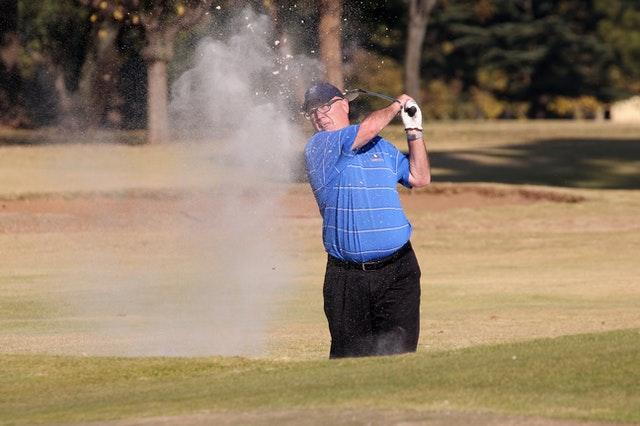
Golf is a game of ups and downs, of course you already knew that! Is it possible for a golfer to maintain stable confidence or keep an even keel during 18 holes of good shots, okay shots, bad shots and utterly dreadful shots?
It’s tricky to maintain emotional balance throughout a round of golf.
Some golfers believe the only path to great golf is to be happy and positive even during the bad shots. Golfers that ascribe to that philosophy are doomed, and only experience more destructive peaks and valleys on the golf course. For example, how many times have you seen a golfer drive a ball into the trees and jump up and down for joy? NEVER! In fact, that golfer probably uttered some expletives and slammed his driver against the ground. That golfer may even be you.
Learning to manage your emotions or regulate your emotions so you can stay in an optimal emotional range is critical. In other words, it is important to not get too high or not get too low when you are competing.
How can you regulate emotions to maintain emotional balance?
Emotional balance requires four essential components:
- Self-Awareness – You need to be able to identify what you are feeling and when your emotions move outside of your range that enhances play. For example, you just birdied two consecutive holes toward the end of a round. You feel ecstatic because you are on point to shoot the best score of your life. The excitement you feel amps you up so much that you lose the focus of playing one shot at a time. You end up double bogeying the next 3 holes. This also works in reverse. A few bad shots can create intense negative feelings which detract you from your focus. If you can detect when your emotions move towards the extremes, you will be better equipped to regulate those emotions when they occur.
- Self-Regulation – It’s not enough to simply be aware of your emotions. You should never be at the mercy of your emotions waiting for a good shot to rebound emotionally. Effective psych up and relaxation strategies will help you to stay in a productive emotional range.
- Acceptance – You MUST come to the conclusion that you will have some shots that will not go as planned. There is no perfect round of golf. Steering clear from expecting perfection will lessen the emotional sting when the ball veers off path.
- Focus – Regaining your focus quickly will stop your emotions from taking over your game and hurting performance over the next several holes or even the entire round itself.
Maintaining emotional balance led 38-year-old Chez Reavie to his highest ranking (26th) in 2019. Over the past three years, Reavie has finished 7th or better in driving accuracy and led the PGA Tour 2018-19.
As you could probably attest, bad tee shots can lead to emotional outbursts and ruin your round.
Reavie’s swing coach Mark Blackburn credits emotional balance as the key that helped Reavie over the past few years.
BLACKBURN: “Scoring is all about how disciplined can you stay and how patient can you stay. And I’d say one of Chez’s best strengths is major championship golf. He’s got a great demeanor for that because he never really gets too excited and he never gets too down. When par’s a really good score and scoring is challenging, that’s kind of when he thrives.”
Reavie’s ability to maintain emotional balance has helped him improve his game and shoot lower scores. Emotional balance is a skill that can be learned, but it requires practice.
If you want to stay poised on the course and keep your emotions in check, you will need to dedicate time and effort, but it is well worth it.
Mental Training Tip:
Emotional balance starts with awareness. Look back on your best and worst rounds. Identify the emotions that worked for you and the emotions that worked against you.
What were the circumstances that preceded your anxiety, fear, over-excitement, etc?
Knowing how you react in certain circumstances and how you can temper those reactions will improve your ability to manage your emotions and raise your level of play.
If you have any questions regarding Brain Timing or Mental Game Coaching, please contact Dr. Demetrios Patos at: [email protected]
